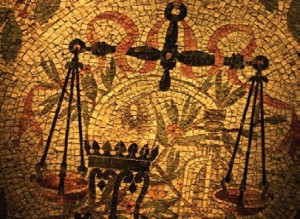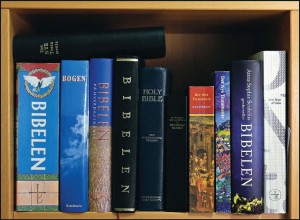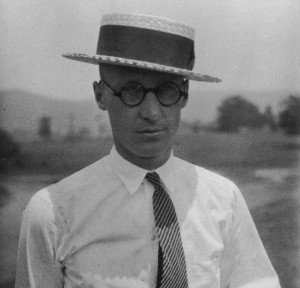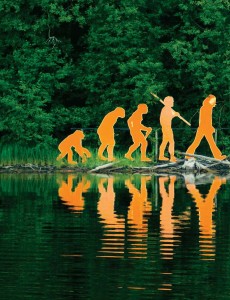MONDAY, 3 FEBRUARY 2014
On a hot summer’s day in Dayton, Tennessee, a most heated debate over the role of religion in dictating scientific teaching was taking place on the lawn outside of the courthouse. Watched by a crowd of unprecedented size, two of the most formidable figures on each side of the evolution debate tried to discredit the other. Immortalized in film, the so-called ‘Scopes Monkey Trial’ has become a key turning point in the struggle between religion and scientific teaching in schools.The stage for the trial was set in 1925, when the Butler Act was passed in Tennessee. Helmed by State Representative John Butler, previously the head of the World Christian Fundamentals Association, the Butler Act aimed to prevent the teaching of evolution in publicly funded classrooms (though strictly only preventing the direct statement that humans were not created by God as laid out in Genesis). However, despite being signed into law by Governor Austin Peay, it remained unenforced throughout the state. Indeed, the biology textbook required for use by all biology teachers in the state included a chapter detailing the theory of natural selection, including the evolution of humans.
As the well known version goes, a high school teacher in a small Tennessee town was then brought to trial for teaching human evolution to his biology class. In fact, the American Civil Liberties Union offered to finance a test case against the law, hoping to have the law struck down as unconstitutional by the courts. The choice of John Scopes as the teacher on trial was essentially arbitrary.
The original idea for Scopes to take on the test trial came from George Rappleyea, a community leader, who believed the trial would bring much- needed publicity to the small town. Rappleyea was able to enlist members of the local school board to support his idea, arguing “As it is, the law is not enforced. If you win, it will be enforced. If I win, the law will be repealed. We’re game, aren’t we?”
Actually a physics teacher, Scopes was approached by the group and asked to plead guilty to teaching evolution during a day substituting in a biology classroom. While Scopes wasn’t even convinced that he had, in fact, taught his students about the evolution of man, he agreed to go along with the test case.
Although the trial was initially going to be tried by local prosecutors, it soon became clear that each side would try to bring in the most high-profile teams possible. For the prosecution, the clear choice was William Jennings Bryan. A three-time presidential nominee and former Secretary of State, Bryan was also renowned for being a staunch Presbyterian and supporter of the Butler Act. His bombastic rhetoric and high national profile ensured that the case would be able to grow in controversy. Clarence Darrow, a well-known agnostic, offered to head the defence team, roused by the threats he saw posed towards rational scientific inquiry and teaching. Two such strident minds seemed poised to raise the trial beyond a mere discussion of constitutionality and instead to a pitched battle between two opposing forces, each damaging the world order in the eyes of their opponents.
As the trial got underway, the intense media attention that suddenly focused on the Scopes Trial and on small-town Dayton was exactly what Rappleyea and his co-conspirators were hoping for. Nationally there was unprecedented interest in the trial, framed as the ‘Monkey Trial’ and picked up by all the main national and international newspapers. As curiousity-seekers flooded Dayton, filling the courthouse to capacity and spilling out into the lawn, the trial was broadcast live over national radio, the first time for any trial. The nation really had been gripped by Scopes fever.
Initially the defence had planned to argue that the Butler Act stripped teachers of individual freedoms by preventing them from teaching evolution, and was as a result unconstitutional. This soon changed into arguing that the theory of evolution and the creation of man in the Bible were not contradictory.
As the trial progressed, attacks were increasingly made on the position of the Bible in scientific thought, as well as on the veracity of the Bible itself by the defence. After Bryan spoke against evolution, bemoaning the fact that humans were “Not even [descended] from American monkeys, but from old world monkeys”, Dudley Field Malone, a member of the defence team, gave what was widely considered to be the triumphant speech of the trial. Malone argued against the place of the Bible in scientific inquiry, saying it should be limited to the study of theology and morality. There was no space for a ‘duel’ between the Bible and evolution as “there is never a duel with the truth.”
It’s been suggested that Bryan complied with the next, very outlandish, request from the defence as a way to recover his standing from Malone’s verbal drubbing. Having called Bryan to the stand to demonstrate the foibles of relying on the Bible for historical accuracy, Darrow proceeded to grill him on many aspects of scripture, from the creation of Eve from Adam’s rib to where Cain found his wife, in an attempt to demonstrate its unscientific nature. Or, as Bryan put it, “to cast ridicule on everybody who believes in the Bible.”
Despite such dramatic scenes in the court, sparking discussion around the United States, the trial itself ended on an underwhelming note. Scopes was found guilty of teaching evolution and fined $100 by order of the judge. The case was then appealed by the defence and brought before the Supreme Court of Tennessee. This time the defence’s argument focused on the less polarising but perhaps more crucial issue of the Butler Act, arguing that it unconstitutionally protected one religion above others. However the defence failed to achieve the result they hoped. The guilty verdict of Scopes was overturned on a technicality, preventing further appeal to a higher court.
It would take until 1967 for the Butler Act to be repealed and until the following year for the Supreme Court of the United States to overturn any other such bans. Despite this, the trial has often been hailed as a victory for scientists, particularly after the dissection of Bryan’s belief in the historical accuracy of the Bible.
In 1925, evolution was put on trial in Tennessee and what followed was one of the most dramatic public duels between those favoring rational scientific discourse and those supporting the imposition of religious views into scientific teaching. While this was over 75 years ago, little has changed since. In 2012, 46 per cent of Americans agreed with the statement “God created humans in their present form”, whilst 15 percent agreed with the statement “Humans evolved, but God had no part in the process.” It’s easy to brush aside the Scopes trial as an artifact from a less educated era, but it seems the beliefs of many remain stoically opposed to scientific evidence.
Sophie Harrington is a 2nd year Biological Natural Scientist at King’s College




